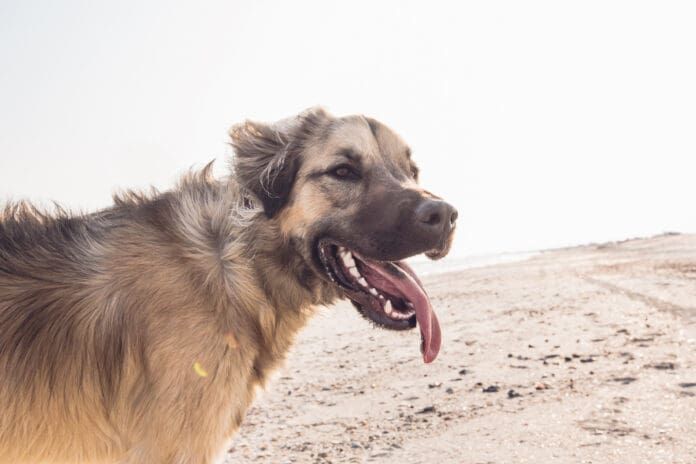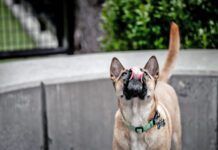If your dog won’t stop panting or settle down, she is probably either hot, stressed, or having trouble getting enough air. Panting is the primary way that dogs drop their body temperature when they are overheated. This is why dogs pant heavily after strenuous exercise or when summer temps skyrocket.
Dogs also pant when they are stressed. This could be due to a loud noise, being in a place that your dog doesn’t like, or general anxiety. Other signs that your dog is distressed include tense face and posture, ears turned back and the whites of the eyes showing, and carrying her tail low and close to her body. She may also whine and pace or show destructive behaviors.
More concerning is the dog who is panting because she is having trouble breathing. Senior dogs can develop laryngeal paralysis, where the vocal folds in the throat are unable to move properly and can block the airway. These dogs frequently pant as a means of forcing air through. Other causes of difficulty breathing include respiratory infections, pneumonia, cancer in the lungs, and heart failure.
Other signs that your dog isn’t getting enough air include:
- Pale, bluish, or purple tongue and gums
- Stretching the head and neck out straight from the body
- Collapse, especially during exercise
- Abdomen moving in and out dramatically as the dog breathes
My Dog Keeps Panting and Won’t Settle at Night
We get it: A dog endlessly pacing and panting at night is annoying at best. It can prevent you from sleeping, which is a problem.
Dog May Need to Go Out
Not wanting to settle may mean that your dog needs to go outside, especially if she is a young puppy or a senior dog. These guys don’t have quite the bladder capacity of adult dogs in their prime. If your dog tends to pee only a small amount at a time, walk her long enough that she can completely empty her bladder before coming back inside.
Urinary tract infections and gastrointestinal upset that leads to diarrhea may cause your dog to need more frequent bathroom breaks. This discomfort can also lead to panting because your dog is stressed. Some medications, such as prednisone, can also make your dog urinate larger amounts and more often.
If your dog settles after a quick bathroom break, nothing to worry about. If these extra trips outside become a frequent issue, however, it is time for a vet visit.
Stress
Dogs may pace and pant at night if they are stressed. Possible triggers could be an alarm sounding somewhere in the house, moving to a new home, adding a new family member, fireworks, or storms.
If you can identify something that is stressing your dog, try to eliminate the cause or dampen its sound. You can also make sure your dog gets plenty of exercise before bedtime so that she is tired and more likely to go to sleep.
If your dog has more generalized anxiety that shows up during the day or just doesn’t resolve, she may need anti-anxiety medications from your vet or a veterinary behaviorist.
Pain
Pain can cause dogs to pant and pace. If your dog is hurting, she will have trouble getting comfortable, and may keep moving in an effort to find a better spot to rest. Pain also causes stress, resulting in the panting.
If you suspect your dog is in pain, schedule a veterinary exam to find out where your dog hurts and why so she can be treated appropriately.
Cognitive Dysfunction
Just like humans, dog brains can get a little bit addled as they age. Doggy dementia is called canine cognitive dysfunction, or CCD. Classic signs of this disorder are senior dogs wandering around, especially at night, and then sleeping at weird times of day. Your dog may also seem disoriented or have other personality changes.
Thankfully, there is a treatment for canine cognitive dysfunction. The medication selegiline (brand name Anipryl) is helpful for many dogs, and can restore your dog to her normal personality and habits. Enforcing a normal sleep schedule by keeping your dog active during the day can also help.







Hello: Thank you for the above article. We have an approximately 15 year old jack russel mix who has an isse with anxiety, panting and restlessness at night. Could WDJ possibly do a new and updated article on effective treatments for Canine Cognitive Dysfunction? Having a poll that readers can participate in would be terrific ie, what are they using. We had previously tried selegiline with no luck. Thank in advance for your consideration of this request. There really is not much out there on how owners are dealing with CCD.
A few years ago, one of my dogs started panting, pacing and unable to settle down. All night! It was so out of character that I took him to an Urgent Care in the middle of the night. No conclusion.
My own vet had the answer. I had put down one of his doggie sisters 3 days prior and he had just realized that one of his pack was not coming home. They weren’t even very fond of each other. Lesson learned. Dogs grieve too.